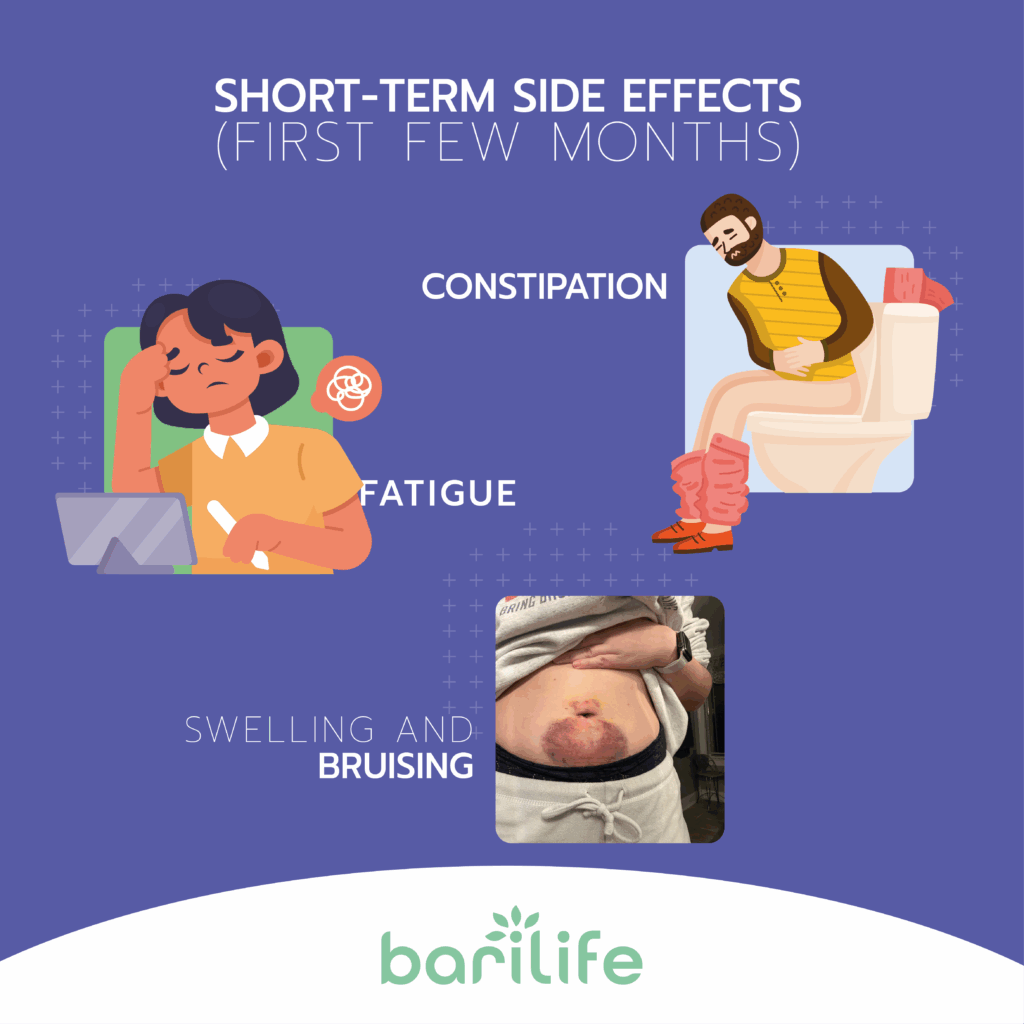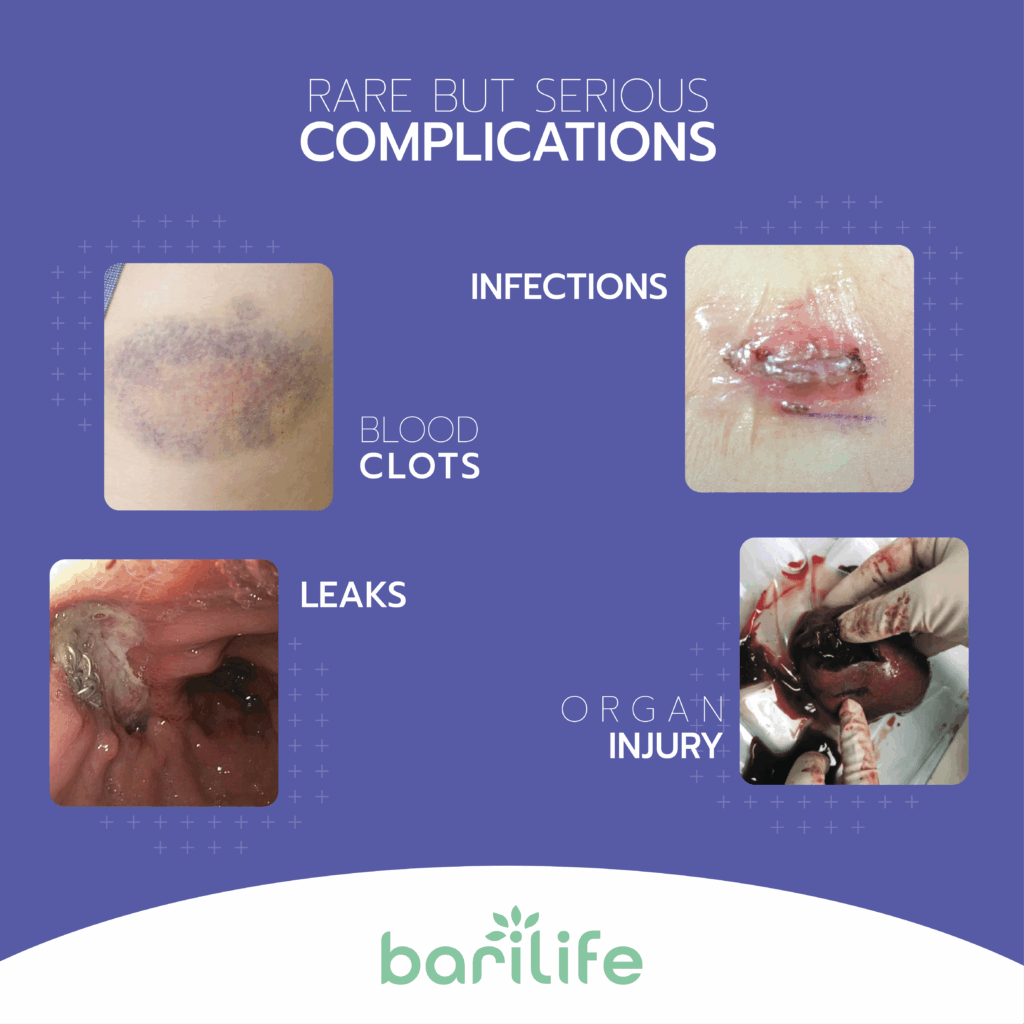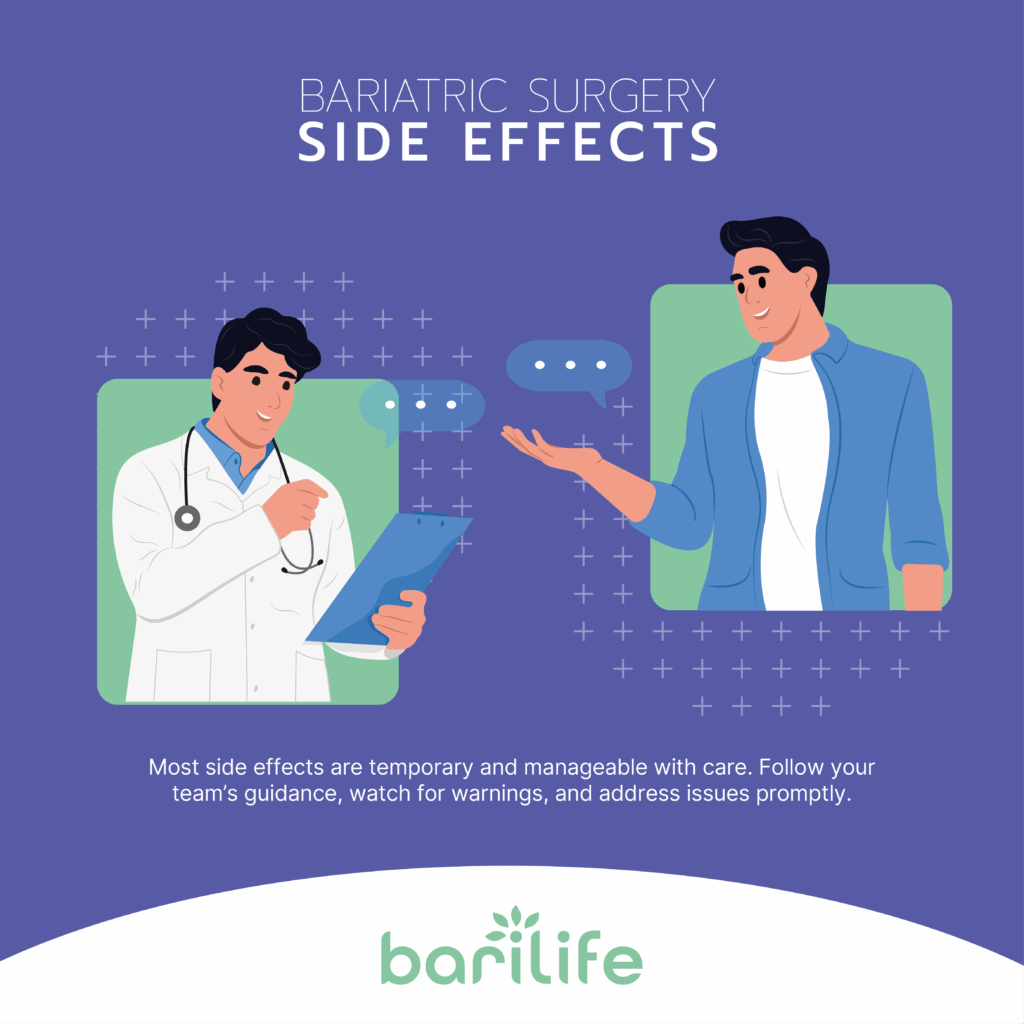Key Takeaways:
- Understanding both the short and long-term side effects of bariatric surgery678 helps you make an informed decision
- Most side effects can be managed with the right care and guidance from your medical team
- Being prepared for potential complications allows you to recognize warning signs and seek help promptly
Considering bariatric surgery is a huge, life-changing decision. However, like any major surgery, it has potential side effects and complications. Understanding the possible bariatric surgery side effects before your procedure helps you prepare mentally and physically for your weight loss journey.
In this article, we break down everything you need to know about potential immediate, short-term, long-term, and more serious side effects.
Table of Contents
Immediate Post-Surgery Side Effects

The first few days after bariatric surgery can be challenging as your body starts to heal. Here are common side effects you might notice right after surgery.
Pain and Discomfort
Feeling pain around your incision sites and in your abdomen is normal. This discomfort varies depending on whether you had a gastric sleeve, bypass, or another type of bariatric procedure. Your medical team will provide pain medication to help manage this discomfort. Pain typically starts to improve several days after surgery.
Nausea and Vomiting
Many people experience nausea shortly after waking up from surgery. It can be due to the anesthesia or pain medications. Your doctor might prescribe anti-nausea medication to help with these symptoms. It also helps to sip small amounts of clear liquids to ease your nausea.
Drowsiness and Confusion
Don’t be alarmed if you feel groggy or confused after surgery. Anesthesia affects everyone differently, and these feelings typically clear up within a day or two. This temporary side effect of bariatric surgery is normal as your body processes the medications used during your procedure.
Sore Throat
If you wake up with a scratchy or sore throat, it’s likely from the breathing tube used during surgery. This tube helps you breathe while under anesthesia, but it can irritate your throat. Throat lozenges, cool liquids, or throat sprays can provide relief as this discomfort fades.
Short-Term Side Effects (First Few Months)
As you recover and heal over the first few months, you might experience these common bariatric side effects.
Constipation
Changes in your diet, reduced food intake, pain medications, and decreased physical activity can all contribute to constipation after bariatric surgery. Staying hydrated, gradually increasing your activity level, and taking any recommended stool softeners can help manage this issue.
Fatigue

Feeling tired is normal during recovery. Your body is healing from major surgery while adjusting to significantly reduced calorie intake. This bariatric symptom typically improves as your body adapts to your new eating pattern and you begin adding more physical activity into your daily routine.
Swelling and Bruising
You’ll likely notice swelling and bruising around your bariatric surgery incisions. This is a natural part of your body’s healing process. Following bariatric wound care instructions and avoiding tight clothing around your abdomen can help minimize discomfort as these symptoms resolve.
Long-Term Side Effects
Some effects of bariatric surgery may persist longer or develop months or years after your procedure.
Chronic Pain
While uncommon, some people experience ongoing discomfort around their surgical sites. In rare cases, adhesions (internal scar tissue) can cause pain months or years after surgery. If you experience persistent pain, discuss it with your healthcare provider, as there are options to manage this long-term side effect of bariatric surgery.
Scar Tissue Formation
As your body heals, it forms scar tissue internally and externally. Sometimes, this tissue can cause tightness or discomfort. In rare cases, internal bariatric surgery scars might lead to bowel obstructions that require medical attention.
Nerve Damage
During surgery, there’s a small risk of nerve damage near the surgery site. It can cause numbness, tingling, or burning sensations that may be temporary or, rarely, permanent. These bariatric surgery disadvantages occur infrequently but should be discussed with your surgeon.
Nutritional Deficiencies
One of the most common long-term side effects of bariatric surgery is difficulty absorbing certain nutrients. Your modified digestive system may not absorb vitamins and minerals as efficiently, potentially leading to deficiencies in iron, vitamin B12, calcium, and other nutrients. It’s why lifelong supplementation is crucial after bariatric surgery.
Hair Loss

Many people experience some degree of hair thinning or loss in the months following surgery. This happens due to the stress of surgery on the body and reduced protein intake. Hair typically grows back as nutrition improves and the body adjusts.
Dumping Syndrome
Dumping syndrome mainly occurs after a gastric bypass. When food, especially sugar, moves too quickly from your stomach to your intestines, you might experience nausea, vomiting, diarrhea, dizziness, and sweating. Modifying your diet by avoiding trigger foods can help manage this disadvantage of bariatric surgery.
Rare but Serious Complications
While uncommon, these complications represent the more serious downside of bariatric surgery:
- Infections: Despite preventive measures, infections can develop at the incision sites or internally. Signs include increasing pain, redness, swelling, warmth, discharge from incisions, and fever.
- Blood clots (deep vein thrombosis): Reduced mobility after surgery raises the risk of blood clots forming in your legs. These clots can induce pain and swelling and may become dangerous if they travel to your lungs. Early walking and movement after surgery help reduce this risk.
- Pulmonary embolism: This life-threatening condition happens when a blood clot travels to your lungs. Watch out for symptoms like sudden shortness of breath, chest pain, rapid heart rate, and coughing (sometimes with blood). This serious bariatric sleeve complication requires immediate emergency care.
- Organ injury: Very rarely, nearby organs might be inadvertently damaged during surgery. It can include injuries to the spleen, liver, or intestines. Such complications might require additional surgery to repair.
- Leaks: After procedures like the gastric sleeve or bypass, there’s a slight risk that the surgical connections might leak digestive contents into your abdomen. This serious negative effect of bariatric surgery requires prompt surgical intervention.
- Strictures or stenosis: Narrowing at surgical connection points can develop, making it difficult for food to pass through. It might cause vomiting after eating and require additional procedures to correct.

How to Manage & Minimize Side Effects
Taking proactive steps can help reduce many of the negatives of bariatric surgery:
- Adhere to post-op instructions: Your surgical team will provide specific guidelines for recovery. Make sure to follow these instructions carefully, including dietary progression, activity restrictions, and medication use.
- Pain management: Take pain medications as prescribed, and try complementary approaches like deep breathing, gentle movement, and proper positioning. Report any pain that seems excessive or doesn’t improve with medication to your healthcare team.
- Early mobilization: Getting out of bed and walking shortly after surgery might feel challenging, but it’s important for preventing complications like blood clots and pneumonia. Begin slowly and gradually raise your activity level as advised by your healthcare team.
- Monitor for signs of complications: Know the warning signs that warrant immediate attention, such as fever, increasing pain, shortness of breath, rapid heart rate, persistent vomiting, or unusual drainage from incisions. Early intervention can prevent the side effects of bariatric surgery for obesity from becoming serious problems.
- Maintain a healthy diet: Follow your post-surgery diet plan carefully, progressing through the stages as recommended. Staying hydrated, eating protein-rich foods, and taking small bites can help prevent many digestive side effects. Avoid foods that trigger discomfort, and take time to adjust to your new eating patterns.
- Take supplements religiously: Commit to taking your recommended vitamins and minerals daily. These supplements are essential for preventing nutritional complications, which are among the most common long-term effects of bariatric surgery.
- Attend all follow-up appointments: Regular check-ups allow your healthcare team to monitor your recovery. They can address emerging issues and adjust your care plan as needed.
- Join a support group: Connecting with others who understand the bariatric surgery after effects can give you the emotional support you need.
Conclusion

Knowing the potential side effects and complications of bariatric surgery doesn’t mean you should avoid this life-changing procedure. For many people, the benefits of significant weight loss and improved health conditions far outweigh the potential risks. However, being informed about possible bariatric symptoms helps you make an educated decision and prepare appropriately for your surgery.
Remember that most side effects are temporary and manageable with proper care. By following your medical team’s guidance, staying vigilant for warning signs, and addressing complications promptly, you can minimize severe issues and focus on the positive changes bariatric surgery brings to your life.
The key to success after surgery is being proactive in your health care. Ask questions, report concerns, follow guidelines, and commit to the lifestyle modifications advised by your doctor. With enough preparation and ongoing care, you can manage the side effects of bariatric surgery while embracing the benefits of improved health and quality of life.
How Bari Life Can Help
Proper nutritional support makes managing potential bariatric side effects much easier—and that’s where Bari Life comes in. Our specialized bariatric vitamins are formulated to address the unique nutritional needs of bariatric surgery patients.
We offer a variety of complete bariatric multivitamins, including bariatric multivitamin with iron options, to help prevent the dietary deficiencies that can occur as long-term side effects of weight loss surgery. For those who prefer an alternative format, our bariatric vitamins chewable and liquid bariatric vitamin solutions make supplementation simple and convenient.
In addition to essential vitamins, we also provide bariatric protein shakes and bariatric protein bars to support proper healing, muscle maintenance, and minimize hair loss. These protein-rich options are especially beneficial during the early post-op phase when dietary intake may be limited.
Our product line also includes bariatric calcium chews for bone health, bariatric probiotic supplements to support gut health, and even delicious bariatric snacks that align with your nutritional goals.
We understand that concerns such as bariatric vitamins for hair loss and post-surgery fatigue are real. That’s why Bari Life delivers evidence-based solutions that support recovery and long-term well-being.
Visit Bari Life‘s website today to explore our complete range of products designed specifically for your bariatric journey. Your successful recovery and long-term health are our priority!
If you want to learn more, why not check out these articles below:
Resources
Bariatric Surgery and Constipation. (2013). Penn Medicine.
Dumping Syndrome After Gastric Bypass Surgery. (n.d.) Hopkins Medicine.



What are your tips and tricks to post-bariatric success?